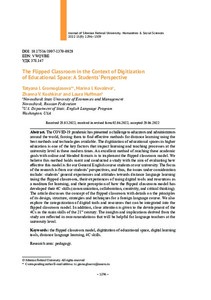Показать сокращенную информацию
The Flipped Classroom in the Context of Digitization of Educational Space: A Students’ Perspective
| Автор | Gromoglasova, Tatyana I. | en |
| Автор | Kovaleva, Marina I. | en |
| Автор | Koshkina, Zhanna V. | en |
| Автор | Huffman, Laura | en |
| Автор | Громогласова, Т. И. | ru_RU |
| Автор | Ковалева, М. И. | ru_RU |
| Автор | Кошкина, Ж. В. | ru_RU |
| Автор | Хафман, Лора | ru_RU |
| Дата внесения | 2022-08-01T04:09:32Z | |
| Дата, когда ресурс стал доступен | 2022-08-01T04:09:32Z | |
| Дата публикации | 2022-09 | |
| URI (для ссылок/цитирований) | https://elib.sfu-kras.ru/handle/2311/148211 | |
| Аннотация | The COVID‑19 pandemic has presented a challenge to educators and administrators around the world, forcing them to find effective methods for distance learning using the best methods and technologies available. The digitization of educational spaces in higher education is one of the key factors that impact learning and teaching processes at the university level in these modern times. An excellent method of reaching these academic goals with online and blended formats is to implement the flipped classroom model. We believe this method holds merit and conducted a study with the aim of evaluating how effective this model is for our General English course students at our university. The focus of the research is from our students’ perspectives, and thus, the issues under consideration include: students’ general experiences and attitudes towards distance language learning using the flipped classroom, their experiences of using digital tools and resources as a medium for learning, and their perception of how the flipped classroom model has developed their 4C skills (communication, collaboration, creativity, and critical thinking). The article discusses the concept of the flipped classroom with details on the principles of its design, structure, strategies and techniques for a foreign language course. We also explore the categorization of digital tools and resources that can be integrated into the flipped classroom model. In addition, close attention is given to the development of the 4Cs as the main skills of the 21st century. The insights and implications derived from the study are reflected in recommendations that will be helpful for language teachers at the university level | en |
| Аннотация | Пандемия COVID‑19 стала вызовом для преподавателей и руководящего состава университетов по всему миру, поскольку возникла острая потребность в поиске эффективных методов и технологий для осуществления образовательного процесса в дистанционном формате. Цифровизация образовательного пространства вузов выступила ключевым процессом, повлиявшим на учебную деятельность в этот период. Данная статья посвящена исследованию состоятельности технологии перевернутого класса для дистанционного изучения дисциплины «Иностранный язык». Здесь обсуждаются принципы разработки занятий в рамках указанной технологии и их структура, приводится классификация цифровых образовательных инструментов и онлайн-ресурсов, которые могут быть интегрированы в модель перевернутого класса. Кроме того, особое внимание уделено потенциалу обсуждаемой технологии для развития таких ключевых навыков XXI века, как 4С (коммуникация, командная работа, креативность и критическое мышление). Исследование выполнено в рамках студентоцентрированного подхода: авторы анализируют данные студенческих анкет об опыте дистанционного изучения иностранного языка с использованием технологии перевернутого класса, предпочтения студентов относительно цифровых инструментов и онлайн-ресурсов как средств обучения, а также восприятие того, насколько модель перевернутого класса способствует развитию навыков 4С. Полученные результаты исследования нашли отражение в методических рекомендациях для преподавателей иностранных языков в вузе | ru_RU |
| Язык | en | en |
| Издатель | Сибирский федеральный университет. Siberian Federal University | en |
| Тема | the flipped classroom model | en |
| Тема | digitization of educational space | en |
| Тема | digital learning tools | en |
| Тема | distance language learning | en |
| Тема | 4C skills | en |
| Тема | модель перевернутого класса | ru_RU |
| Тема | цифровизация образовательного пространства | ru_RU |
| Тема | цифровые инструменты обучения | ru_RU |
| Тема | дистанционное обучение иностранным языкам | ru_RU |
| Тема | навыки 4С | ru_RU |
| Название | The Flipped Classroom in the Context of Digitization of Educational Space: A Students’ Perspective | en |
| Альтернативное название | Технология перевернутого класса в контексте цифровизации образовательного пространства: взгляд студентов | ru_RU |
| Тип | Journal Article | en |
| Контакты автора | Gromoglasova, Tatyana I.: Novosibirsk State University of Economics and Management Novosibirsk, Russian Federation; t.i.gromoglasova@nsuem.ru | en |
| Контакты автора | Kovaleva, Marina I.: Novosibirsk State University of Economics and Management Novosibirsk, Russian Federation | en |
| Контакты автора | Koshkina, Zhanna V.: Novosibirsk State University of Economics and Management Novosibirsk, Russian Federation | en |
| Контакты автора | Huffman, Laura: U.S. Department of State, English Language Program Washington, USA | en |
| Контакты автора | Громогласова, Т. И.: Новосибирский государственный университет экономики и управления Российская Федерация, Новосибирск | ru_RU |
| Контакты автора | Ковалева, М. И.: Новосибирский государственный университет экономики и управления Российская Федерация, Новосибирск | ru_RU |
| Контакты автора | Кошкина, Ж. В.: Новосибирский государственный университет экономики и управления Российская Федерация, Новосибирск | ru_RU |
| Контакты автора | Хафман, Лора: Государственный департамент США, Отделение английского языка Вашингтон, США | ru_RU |
| Страницы | 1296–1309 | ru_RU |
| DOI | 10.17516/1997-1370-0929 | |
| Журнал | Журнал Сибирского федерального университета. Гуманитарные науки. Journal of Siberian Federal University. Humanities & Social Sciences; 2022 15 (9) | en |

